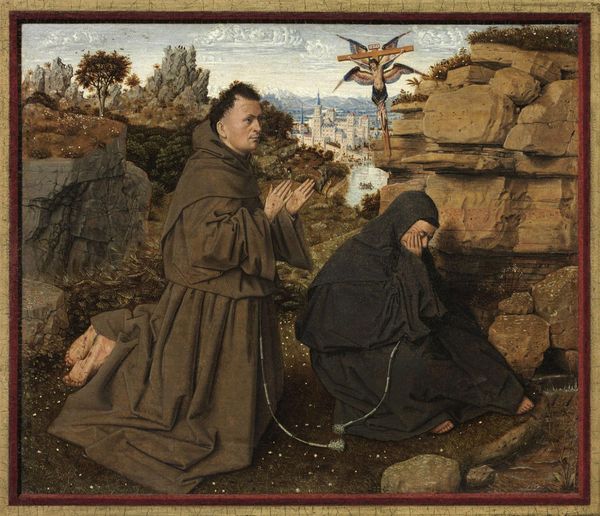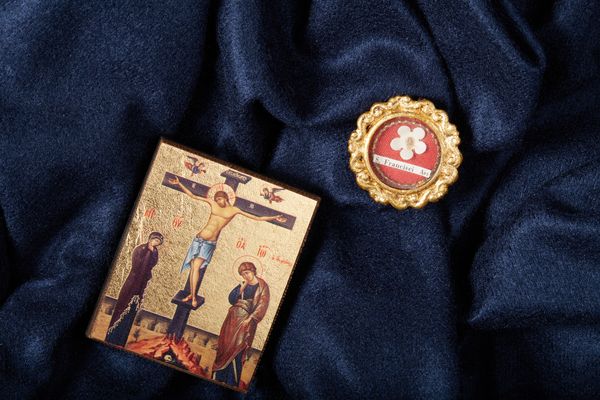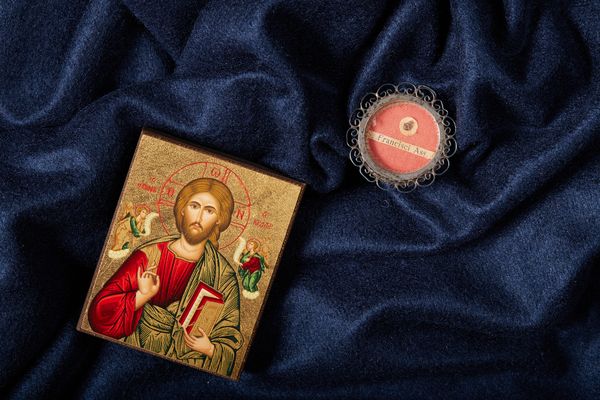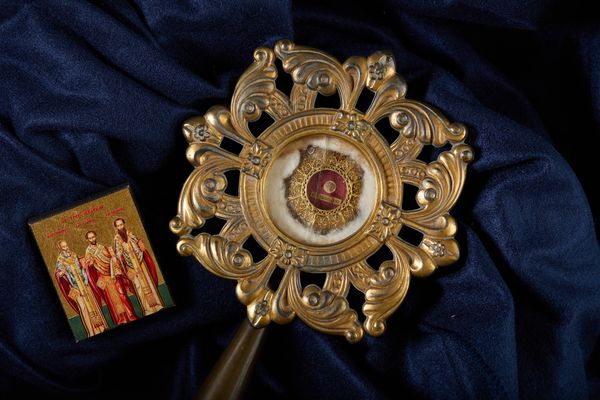Indulged by his parents, Francis lived the high-spirited life typical of a wealthy young man. He was handsome, witty, gallant, and delighted in fine clothes. He spent money lavishly. His disillusionment toward the world that surrounded him came fairly early in his life, as is shown in the "story of the beggar". He was selling cloth and velvet in the marketplace on behalf of his father when a beggar came to him and asked for alms. At the conclusion of his business deal, Francis abandoned his wares and ran after the beggar. When he found him, Francis gave the man everything he had in his pockets. His friends mocked him for his charity; his father scolded him in rage.
Around 1202, he joined a military expedition against Perugia and was taken as a prisoner at Collestrada. He spent a year as a captive, during which an illness caused him to re-evaluate his life. However, upon his return to Assisi in 1203, Francis returned to his carefree life. In 1205, Francis left for Apulia to enlist in the army of Walter III, Count of Brienne. A strange vision made him return to Assisi and lose interest in the worldly life. Thereafter he began to avoid the sports and feasts of his former companions. A friend asked him whether he was thinking of marrying, to which he answered: "Yes, a fairer bride than any of you have ever seen", meaning his "Lady Poverty".
On a pilgrimage to Rome, he joined the poor in begging at St. Peter's Basilica. He spent some time in lonely places, asking God for spiritual enlightenment. He said he had a mystical vision of Jesus Christ in the forsaken country chapel of San Damiano, just outside Assisi, in which the Icon of Christ Crucified said to him, "Francis, Francis, go and repair My church which, as you can see, is falling into ruins." He took this to mean the ruined church in which he was presently praying, and so he sold some cloth from his father's store to assist the priest there. When the priest refused to accept the ill-gotten gains, an indignant Francis threw the coins on the floor.
In order to avoid his father's wrath, Francis hid in a cave near San Damiano for about a month. When he returned to town, hungry and dirty, he was dragged home by his father, beaten, bound, and locked in a small storeroom. Freed by his mother during his father's absence, Francis returned at once to San Damiano, where he found shelter with the officiating priest, but he was soon cited before the city consuls by his father. The latter, not content with having recovered the scattered gold from San Damiano, sought also to force his son to forego his inheritance by way of restitution. In the midst of legal proceedings before the Bishop of Assisi, Francis renounced his father and his patrimony. Some accounts report that he stripped himself naked in token of this renunciation, and the bishop covered him with his own cloak.
For the next couple of months, Francis wandered as a beggar in the hills behind Assisi. He spent some time at a neighbouring monastery working as a scullion. He then went to Gubbio, where a friend gave him, as an alms, the cloak, girdle, and staff of a pilgrim. Returning to Assisi, he traversed the city, begging stones for the restoration of St. Damiano's. These he carried to the old chapel, set in place himself, and so at length rebuilt it. Over the course of two years, he embraced the life of a penitent, during which he restored several ruined chapels in the countryside around Assisi, among them San Pietro in Spina and the Porziuncola, the little chapel of St. Mary of the Angels in the plain just below the town. This later became his favorite abode. By degrees he took to nursing lepers, in the lazar houses near Assisi.
The Franciscan Orders
One morning in February 1208, Francis was taking part in a Mass in the chapel of St. Mary of the Angels, near which he had by then built himself a hut. The Gospel of the day was the "Commissioning of the Twelve" from the Book of Matthew. The disciples were to go and proclaim that the Kingdom of God is at hand. Francis was inspired to devote himself to a life of poverty. Having obtained a coarse woolen tunic, the dress then worn by the poorest Umbrian peasants, he tied it around himself with a knotted rope and went about exhorting the people of the countryside to penance, brotherly love, and peace. Francis's preaching to ordinary people was unusual as he had no license to do so.
His example attracted others. Within a year Francis had eleven followers. The brothers lived a simple life in the deserted lazar house of Rivo Torto near Assisi; but they spent much of their time wandering through the mountainous districts of Umbria, making a deep impression upon their hearers by their earnest exhortations.
In 1209 he composed a simple rule for his followers ("friars"), the Regula primitiva or "Primitive Rule", which came from verses in the Bible. The rule was "to follow the teachings of our Lord Jesus Christ and to walk in his footsteps." He then led his to Rome to seek permission from Pope Innocent III to found a new religious order. Upon entry to Rome, the brothers encountered Bishop Guido of Assisi, who had in his company Giovanni di San Paolo, the Cardinal Bishop of Sabina. The Cardinal, who was the confessor of Pope Innocent III, was immediately sympathetic to Francis and agreed to represent Francis to the pope. After several days, the pope agreed to admit the group informally, adding that when God increased the group in grace and number, they could return for an official audience. The group recognized Church authority and prevented his followers from accusations of heresy. Though a number of the pope's counselors considered the mode of life proposed by Francis to be unsafe and impractical, following a dream in which he saw Francis holding up the Lateran Basilica, he decided to endorse Francis's order. This occurred, according to tradition, on 16 April 1210, and constituted the official founding of the Franciscan Order. The group, then the "Lesser Brothers" (Order of Friars Minor also known as the Franciscan Order or the Seraphic Order), were centered in the Porziuncola and preached first in Umbria, before expanding throughout Italy. Francis was later ordained a deacon, but not a priest.
Sainthood
After growing the Franciscan Order, with many pilgrimages and travels evangelizing, while he was praying on the mountain of Verna, during a forty-day fast in preparation for Michaelmas (29 September), Francis is said to have had a vision on or about 13 September 1224, the Feast of the Exaltation of the Cross, as a result of which he received the stigmata. Brother Leo, who had been with Francis at the time, left a clear and simple account of the event, the first definite account of the phenomenon of stigmata. "Suddenly he saw a vision of a seraph, a six-winged angel on a cross. This angel gave him the gift of the five wounds of Christ."Suffering from these stigmata and from trachoma, Francis received care in several cities (Siena, Cortona, Nocera) to no avail. In the end, he was brought back to a hut next to the Porziuncola. Here he spent his last days dictating his spiritual testament. He died on the evening of Saturday, 3 October 1226, singing Psalm 141, "Voce mea ad Dominum".
On 16 July 1228, he was declared a saint by Pope Gregory IX (the former cardinal Ugolino di Conti, a friend of Francis and Cardinal Protector of the Order). The next day, the pope laid the foundation stone for the Basilica of St. Francis in Assisi. Francis was buried on 25 May 1230, under the Lower Basilica, but his tomb was soon hidden on orders of Brother Elias, in order to protect it from Saracen invaders. His burial place remained unknown until it was rediscovered in 1818. Pasquale Belli then constructed a crypt for the remains in the Lower Basilica. It was refashioned between 1927 and 1930 into its present form by Ugo Tarchi. In 1978, the remains of Francis were examined and confirmed by a commission of scholars appointed by Pope Paul VI, and put into a glass urn in the ancient stone tomb.



